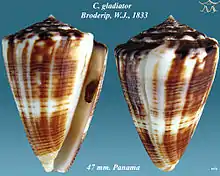| Gladioconus | |
|---|---|
 | |
| Apertural and abapertural views of shell of Conus gladiator Broderip, 1833 | |
| Scientific classification | |
| Kingdom: | |
| Phylum: | |
| Class: | |
| (unranked): | |
| Superfamily: | |
| Family: | |
| Genus: | |
| Subgenus: | Gladioconus Tucker & Tenorio, 2009 |
| Synonyms | |
|
Conus (Monteiroconus) da Motta, 1991 | |
Gladioconus is a synonym of a subgenus of sea snails, marine gastropod mollusks in the genus Conus, family Conidae, the cone snails and their allies.[1] T
In the latest classification of the family Conidae by Puillandre N., Duda T.F., Meyer C., Olivera B.M. & Bouchet P. (2015), Gladioconus has become a subgenus of Conus as Conus (Monteiroconus) represented as Conus Linnaeus, 1758 [2]
Distinguishing characteristics
The Tucker & Tenorio 2009 taxonomy distinguishes Gladioconus from Conus in the following ways:[3]
- Genus Conus sensu stricto Linnaeus, 1758
- Shell characters (living and fossil species)
- The basic shell shape is conical to elongated conical, has a deep anal notch on the shoulder, a smooth periostracum and a small operculum. The shoulder of the shell is usually nodulose and the protoconch is usually multispiral. Markings often include the presence of tents except for black or white color variants, with the absence of spiral lines of minute tents and textile bars.
- Radular tooth (not known for fossil species)
- The radula has an elongated anterior section with serrations and a large exposed terminating cusp, a non-obvious waist, blade is either small or absent and has a short barb, and lacks a basal spur.
- Geographical distribution
- These species are found in the Indo-Pacific region.
- Feeding habits
- These species eat other gastropods including cones.[3]
- Shell characters (living and fossil species)
- Subgenus Gladioconus Tucker & Tenorio, 2009
- Shell characters (living and fossil species)
- The shell is obconic to turbinate in shape, with broad shoulders. The protoconch is multispiral, and the whorls have nodules which may persist or become obsolete. The body whorl is typically ornamented with ridges. The anal notch is fairly deep, except in smaller specimens. The color patterns include brown or red banded shells, and rarely mostly white shells. The periostracum is tufted, and the operculum is small.
- Radular tooth (not known for fossil species)
- The anterior sections of the radular tooth is longer than or similar in length to the posterior section. The blade is long, and is more than half as long as the anterior section of the tooth. A basal spur is present, the barb is short, and there is an internal terminating cusp. The radular tooth has coarse serrations.
- Geographical distribution
- The species in this genus occur in the West Atlantic and Eastern Pacific regions, and one species is endemic to the Marquesas Islands.
- Feeding habits
- These cone snails are vermivorous, meaning that the cones prey on polychaete worms.[3]
- Shell characters (living and fossil species)
Species list
This list of species is based on the information in the World Register of Marine Species (WoRMS) list. Species within the genus Gladioconus include:[1]
- Gladioconus binghamae (Petuch, 1987): synonym of Conus binghamae Petuch, 1987
- Gladioconus cuna (Petuch, 1998): synonym of Conus cuna Petuch, 1998
- Gladioconus gladiator (Broderip, 1833): synonym of Conus gladiator Broderip, 1833
- Gladioconus glenni (Petuch, 1993): synonym of Conus glenni Petuch, 1993
- Gladioconus granulatus (Linnaeus, 1758): synonym of Conus granulatus Linnaeus, 1758
- Gladioconus hieroglyphus (Duclos, 1833): synonym of Conus hieroglyphus Duclos, 1833
- Gladioconus hivanus (Moolenbeek, Zandbergen & Bouchet, 2008): synonym of Conus hivanus Moolenbeek, Zandbergen & Bouchet, 2008
- Gladioconus mus (Hwass in Bruguière, 1792): synonym of Conus mus Hwass in Bruguière, 1792
- Gladioconus patae (Abbott, 1971): synonym of Conus patae Abbott, 1971
- Gladioconus ritae (Petuch, 1995): synonym of Conus ritae Petuch, 1995
References
- 1 2 Gladioconus Tucker & Tenorio, 2009. Retrieved through: World Register of Marine Species on 07/20/11.
- ↑ Puillandre N., Duda T.F., Meyer C., Olivera B.M. & Bouchet P. (2015). One, four or 100 genera? A new classification of the cone snails. Journal of Molluscan Studies. 81: 1-23
- 1 2 3 Tucker J.K. & Tenorio M.J. (2009), Systematic Classification of Recent and Fossil Conoidean Gastropods, ConchBooks, Hankenheim, Germany, 295 pp.
Further reading
- Kohn A. A. (1992). "Chronological Taxonomy of Conus, 1758-1840". Smithsonian Institution Press, Washington and London.
- Monteiro A. (ed.) (2007). The Cone Collector 1: 1-28.
- Berschauer D. (2010). Technology and the Fall of the Mono-Generic Family The Cone Collector 15: pp. 51-54
- Puillandre N., Meyer C.P., Bouchet P., and Olivera B.M. (2011), Genetic divergence and geographical variation in the deep-water Conus orbignyi complex (Mollusca: Conoidea), Zoologica Scripta 40(4) 350-363.
External links
This article is issued from Wikipedia. The text is licensed under Creative Commons - Attribution - Sharealike. Additional terms may apply for the media files.